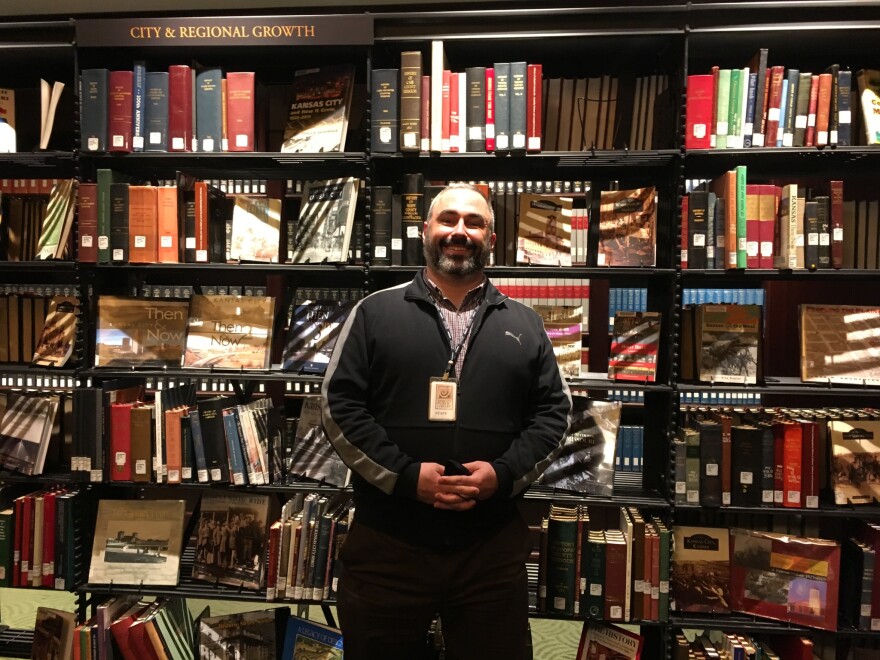For more stories like this one, subscribe to A People's History of Kansas City on Apple Podcasts, Spotify or Stitcher.
John McCoy and 13 of his buddies rounded up $4,220 in 1838 and paid Jackson County for the area we now know as downtown Kansas City. McCoy had been operating an outpost called Westport, a supply stop for settlers and others heading west. He figured the purchase would be good for business.
But the land they purchased had no name, no way to talk about it, nothing to scribble on a map so that others would make it a destination. The group would have to come up with something post haste.
Many Kansas Citians already suspect what’s coming next: the suggestion that our fair city be named “Possum Trot.” It’s a rumor as much entrenched in the local psyche as lore about locals Walt Disney and Ernest Hemingway, and the origins of the world’s greatest barbecue. The New York Times even referenced it recently — the story is no longer just local.
“Stories are super sticky, and they stay with you. Factoids not so much; they tend to slip out. So even after you hear somebody say, ‘Oh it’s not exactly right,’ you’ll still probably remember the story more than the actual fact,” says historian Matt Reeves, who works at the Kansas City Public Library.
In the case of the Possum Trot lore, “actual fact” is extremely elusive — not just as far as the naming goes, but also in regard to how much land McCoy purchased and when he finally paid for it.
Reeves discovered that very few primary sources exist about the city’s naming. One of the only accounts comes from McCoy himself, and he didn’t write about those early conversations with his squad until 40 years after the fact — which doesn’t help with historical accuracy at all.
McCoy’s recollections went like this: He and his 13 friends, all white men, gathered in the cabin of a man referred to as One-Eyed Ellis. One of them, a guy named Abraham Fonda, who liked to dress in fancy clothes, suggested naming the town "Port Fonda."
After that idea was met with groans and a big thumbs down, the men whipped out a dictionary and started tossing out random words. Nothing felt right.
Then an older gent everyone called Old Squire Bowers spoke up.

Reeves reads McCoy’s remembrance of what happened next: “Old Squire Bowers, a dry old speculator who lived down in the Bottoms a mile or two, facetiously suggested 'Rabbitville' or 'Possum Trot,' but was treated with silent contempt. The struggle ended finally with the adoption of Kansas City, by the skin of its teeth.”
So, if McCoy’s memory serves, the episode ended with a vote, but no one ever seriously considered the name Possum Trot — not even the old squire.
But Reeves is quick to point out that before “Kansas City” took hold, the town was called “Kansas” or the “Town of Kansas” a name connected to the Kaw River and the Kanza people. Many place names have their origins in the languages of indigenous people, an important component left out of a lot of stories.
Kennetha Greenwood is an Otoe Missouria language specialist. She says the name Missouri comes from the Otoe Missouria tribe and the name Nebraska comes from a word that means “flat water.”
And Topeka, Greenwood says, “is Do Pe Ke, like, ‘cause that’s good potatoes’—where they used to dig potatoes.”
This land around the intersection of the Kaw and Missouri rivers was an established trading and meeting area long before people of European descent entered the scene—and the names were so ingrained in local identity that they were adopted by those who took over.

Sometimes names stick to places for legitimate reasons. In other instances, like with the Possum Trot story, the material is just too much fun to forget.
In his research, Reeves discovered only two other written accounts of the Possum Trot lore that included the idea of a vote: one in a book published by a funeral home in 1961 called "Through the Years in Kansas City," and another in "Right Here in River City," published in 1976 by Kansas City radio pioneer and storyteller extraordinaire, Walt Bodine. Bodine also served as a source for the funeral home book.
The late journalist’s career spanned 60 decades, and those who knew him say he loved almost nothing more than a good yarn.
But, Reeves points out, Bodine’s rendering of that naming meeting is different from McCoy’s and offers no citations to back up those changes.
Bodine’s account of the same night goes:
“‘All right, I’ll give you a good name,’ another settler declared, ‘And that’s Possum Trot. What do you think of that?’ The group thoughtfully sent the jug around again, and as time wore on, the name Possum Trot started looking good to them. Understandably, no precise minutes were kept, but one historian’s version holds that Kansas City missed being called Possum Trot by a single vote.”
Retired newspaperman Monroe Dodd co-hosted a history radio show with Bodine. He says, “I just think the Possum Trot story — I’ve thought this for a long time — is a little too interesting to be true.”
In any case, the legend has persisted for decades. And never mind the spreading of rumors through books — an internet search shows McCoy’s story shared and reshared and altered in many different ways, as if Kansas Citians are just as enamored of the story today as they have been for nearly 200 years.











